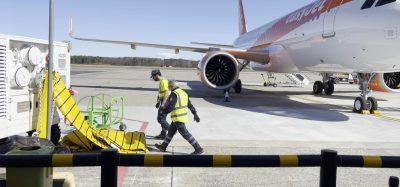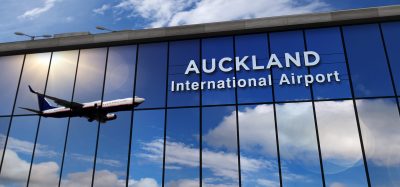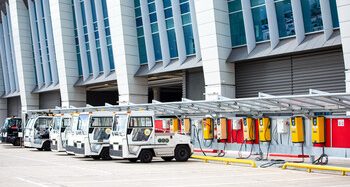Ground handling at AIA
- Like
- Digg
- Del
- Tumblr
- VKontakte
- Buffer
- Love This
- Odnoklassniki
- Meneame
- Blogger
- Amazon
- Yahoo Mail
- Gmail
- AOL
- Newsvine
- HackerNews
- Evernote
- MySpace
- Mail.ru
- Viadeo
- Line
- Comments
- Yummly
- SMS
- Viber
- Telegram
- Subscribe
- Skype
- Facebook Messenger
- Kakao
- LiveJournal
- Yammer
- Edgar
- Fintel
- Mix
- Instapaper
- Copy Link
Posted: 3 April 2007 | Yiorgos Varsamis, Manager, Airines Handling, Athens International Airport S.A. | No comments yet
Athens International Airport’s mission in the area of ground handling can be summarised as “ensuring the reliable supply of quality services at an optimal price level”. In pursuit of this objective, Athens International Airport S.A. (AIA) is actively involved in a triangular relationship with the ground handling providers and the airlines, and cooperates closely with all other key stakeholders, including the Hellenic Civil Aviation Authority, Customs and Police Authorities, and the various international air transport associations (ACI, IATA, EU DG Trend).
Athens International Airport’s mission in the area of ground handling can be summarised as “ensuring the reliable supply of quality services at an optimal price level”. In pursuit of this objective, Athens International Airport S.A. (AIA) is actively involved in a triangular relationship with the ground handling providers and the airlines, and cooperates closely with all other key stakeholders, including the Hellenic Civil Aviation Authority, Customs and Police Authorities, and the various international air transport associations (ACI, IATA, EU DG Trend).
The aforementioned triangular relationship was the driving force leading to the characteristics of the ground handling framework developed, which is designed to serve the following objectives:
- to promote customer-orientated services by meeting the Airport Users’ requirements, while fully complying with capacity, human resources, safety, security, and environmental constraints;
- to provide airlines with a choice when negotiating quality and price of services;
- to promote consistency and sustainability of development by securing the provision of quality services and optimising the utilisation of infrastructure and facilities
Historical background
Since its opening on March 28th, 2001, Athens International Airport adopted a policy of not being involved in the provision of ground handling services itself. Instead, the Airport acts as a platform providing and monitoring the necessary framework as well as the centralised infrastructure, systems and skilled personnel for the efficiency of operations. AIA also provided the context through which the necessary facilities for the provision of ground handling services were developed, either through own constructed and operated facilities (i.e. baggage handling system) or through relevant concessions (i.e. catering, hydrant refueling system).
The smooth opening of the airport was based on the successful planning and execution of a massive project named “EMORAT”, which implemented an overnight transfer of operations from the old “Hellenikon” Airport to the new Athens International Airport “Eleftherios Venizelos”. Massive amounts of equipment were transferred successfully through the night, at a distance of approximately 35Km, to be located and operational at the new airport in the next morning.
Airport success
We believe that the fact that AIA is not directly involved in the provision of the said services, is one of the main reasons contributing to the smooth and constructive co-operation of AIA with all ground handling providers and to the development of a healthy competitive environment from which the end passenger experiences high quality services at optimum prices.
We consider the ground handlers at our airport as partners, and mutual respect has been demonstrated by both sides during various demanding projects and crisis situations. The constructive cooperation and collaboration achieved through events such as the Athens Olympic Games in 2004, extreme weather conditions, hijacks and A/C accidents, confirms the above.
The high quality level of provided services in this competitive environment is being mutually agreed through the introduction of the innovative programme of Service Level Agreements between the airport and the ground handling companies. Another factor contributing to the efficiency of handling operations is the establishment of a ramp management function, which monitors all operations on the ramp and actively contributes to the prompt resolution of problems and the enhancement of operations efficiency through the improvement of the relevant practices and procedures.
The success of the above described set-up, is proved to a large extent through the competitive ground handling prices of our airport, while the quality of services is not jeopardised, as also reflected through the distinctive awards presented to the ground handling operators by various carriers.
Differentiated environment – legal framework
Two years prior to airport opening, Athens International Airport prepared the ground for the provision of the respective services by developing (in consultation with the Airport Users) AIA’s Local Ground Handling Regulation (LGHR), completing in this way the ground handling legislative framework applicable at the airport (i.e EU Directive 96/67, Greek PD 285/98, Basic Ground Handling Regulation and the aforementioned LGHR). The purpose of this regulation is to establish the framework for providing ground handling services at the airport, according to its special needs and characteristics, along with the legal obligations set by the Greek State.
According to the developed framework, for certain categories of ground handling services (i.e for ramp and baggage handling services, freight & mail handling services as well as for fuel handling services), the number of third-party ground handlers is limited. In respect to the remaining categories of ground handling services, access to the provision of the latter is open (unlimited number of ground handlers). The aforementioned set-up ensures effective competition (reducing in this way the need for airlines to self-handle), without jeopardising the safe and efficient operation of the airport.
Based on the above, Athens International Airport initiated the various processes (i.e tender, selection and appointment processes) required as per the stipulations of the legal framework, for the award of the ground handling airport rights. The said processes that have attracted a large number of internationally reputable companies/consortia of companies have been successfully completed with the conclusion of the relevant agreements with the selected/appointed service providers (a total of 45 agreements; self-handling & third party handling).
As a result of the foregoing, the main third-party ground handlers currently operating at Athens International Airport, are:
- Third Party Baggage and Ramp Handling Services:
- Olympic Airways Services
- Swissport
- Goldair Handling
- Self Handling on Baggage and Ramp:
- Aegean Airlines
- Interjet
- Into-Plane Fuelling Services:
- SAFCO
- OIC
- Catering Ramp Handling:
- Olympic Catering
- EUREST
- AG
Level of service – timely performance, safety and environment
Safety awareness is substantially improved at our airport, something which is reflected in the 24.7% reduction in 2006 incidents compared to 2005. In addition to the safety management system that the ground handlers are submitting and are obliged to follow, AIA is carrying out relevant audits ensuring the correct application of the above. The operational results related to safety, as well as any other safety issue, are incorporated in a monthly produced report and discussed in the Safety Committee, which is also held on a monthly basis with the participation of all parties involved.
In terms of delays, the 2006 reported percentage of delays attributed to airport facilities (IATA code 87) is 0.79%, while the percentage of Aircraft and Ramp Handling delays (IATA code 31-39) is 9.44%, which are in general terms considered satisfactory.
Moreover, the ground handling companies are obliged to develop and follow an environmental management plan that covers all aspects of environmental practice, the application of which is closely monitored by AIA. These plans incorporate AIA’s waste management system, which, among other issues, provides for an extensive recycling programme.
Ramp management
As mentioned above, the introduction of the ramp management function contributed to the enhancement of monitoring the relevant operations. This function produces daily reporting on several ground handling operations’ performance. The reporting refers to both operational practices employed (in reference to Airport Operational Manual and Safety of Operations), as well as to the condition of all ground handling equipment engaged. This enables prompt identification of problems and facilitates the effort of continuous improvement of the safety and quality of operations.
Service level agreements
Further to the above, the main factor contributing to the enhancement of the service quality is the introduction of SLA’s between the airport and the handling operators. There are currently two such programmes in place and are proving to be an excellent tool. They do not only facilitate the upgrade of services through the setting of the required service performance levels but they also assist the management of the ground handlers in realising their areas of improvement, as well as their opportunities through the measurement of their performance and the monthly reporting produced by the airport.
This report presents the performance measurements for each area of concern compared to the target and the prior performance of the company, and enables a monthly discussion between the airport and the operator in order to resolve any issues and / or explain any deviations from the target.
As mentioned earlier, the existence of the SLA’s is a great promotional tool for the ground handling companies, who can capitalise on their efforts for improved quality. The Airport Company rewards their good performance providing them the opportunity to promote / advertise their good performance for free through various alternative campaign options.
At present
It is evident that the satisfaction of both airlines and passengers at Athens International Airport “Eleftherios Venizelos” and the outstanding reputation which our airport managed to achieve, are the driving force of the rapid growth rates which our airport experiences since opening. The year 2006 generated a growth rate of 5.4% in terms of passenger traffic and 5.3% in terms of aircraft movements, with passenger traffic exceeding 15 million, and aircraft movements rising to 183,000.
Our airport, through its 6 years of operation, has been honoured with several prestigious awards. Among them:
- IATA awards for “Overall Passenger Satisfaction” for 2001 and 2002
- AETRA (IATA/ACI) Award for “Overall Passenger Satisfaction” for 2003 and 2004
- “European Airport of the Year 2004”
- 2003 IATA Eagle Award
- OAG Airport Marketing Award Winner 2005 and 2006
- ATRS 2006 European Efficiency Excellence Runner-up Award
- “Aerospace Industry Awards 2005”
- Best Cargo Airport 2006
Athens International Airport S.A. implements an attractive “Incentive Programme” policy, rewarding the airlines contributing to traffic development, and the ground handlers contributing to the enhancement of the quality and safety of operations.
Within this context, AIA has rebated, until the end of 2006, to the airlines that contributed to traffic development (further to all other landing and parking charges incentives) a total amount exceeding €2 million on charges related to Ground Handling Infrastructure (i.e. Passenger Boarding Bridges, Ground Power Units, Check-In Counters and Baggage Handling System).
In the future
The Airport Company has gained valuable experience through these 6 years of operations and bearing in mind the forthcoming tender process for the new rights to be in effect in March 2008, this experience will be utilised and reflected in the new tender process and the development of the new agreements with the successful bidders.
Our aim is to set out the parameters that will upgrade the quality of services and sustain a healthy competitive environment. Emphasis will be placed on additional requirements and improved practices in the areas of:
- Environment: Improved practices and additional accreditations
- Quality: Through the development of SLA’s (targeted service level performance) with all handling operators
- Safety: Further improvement of safety awareness through the development of safety awareness programmes
The above, along with the very attractive incentive programmes of Athens International Airport, rewarding traffic development, through rebates in most areas of charges including ground handling infrastructure related charges, and the continuous improvement of our quality of services – recognised through the international awards – builds our confidence and strong belief that Athens International Airport’s rapid growth will continue for the years to come.

















